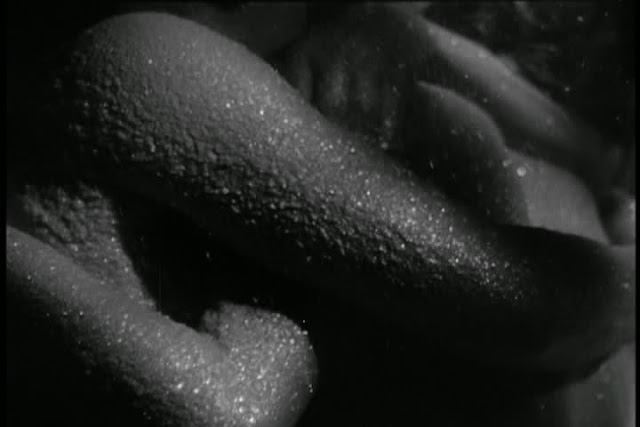May 19, 1960 [Hiroshima mon amour]
 Hiroshima mon amour dismantles the last fifteen years, picks through the pieces, finds only two people more or less intact, and walks them through Hiroshima in a daze of memory and amnesia, disjunction and commingling—and OK, the duality game is an old one; but for God's sake what else is left? Global schizophrenia is driving us all mad—no, that's not right: If we have schizophrenia, we're already nuts, and shouldn't be trusted with the sharp objects of analysis and explanation, let alone apologetics.
Hiroshima mon amour dismantles the last fifteen years, picks through the pieces, finds only two people more or less intact, and walks them through Hiroshima in a daze of memory and amnesia, disjunction and commingling—and OK, the duality game is an old one; but for God's sake what else is left? Global schizophrenia is driving us all mad—no, that's not right: If we have schizophrenia, we're already nuts, and shouldn't be trusted with the sharp objects of analysis and explanation, let alone apologetics. So Resnais works with what we can trust: that which is contrary. The French actress finds herself drawn to Hiroshima, its radioactive dust clinging to her skin until she’s back in Nevers (a sad play on words, French to English), the Loire beautiful and the Occupation standing there, holding its breath, and Bernadette buried there, the one who wanted to love more than to live. And when the actress loved, it was a German soldier, so she was shaved and tossed in the cellar, where she lived on saltpeter and despairing love—and hate.
And her lover today is a Japanese architect—building things, you see, in his home town, where the tourists go to weep. They are both from cities famous for their tombs—so why not go mad?
I'm glad I haven't seen Resnais' film on the concentration camps—and should I be ashamed for that? In Hiroshima mon amour the city goes from sunshine to retiring midnight and beyond, the restaurant all but deserted, the sound turned low on everything. I wanted it to end there, with words unspoken, the calm night modestly turning her head away from us, her shoulder soft in the dim light. But oh no: We must remember every step of our descent, and pass that moment when we wonder if we're mad—to the point where we forget we wondered, and can't tell.


You sure have your way with words!
ReplyDelete